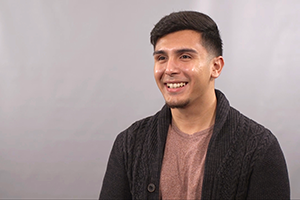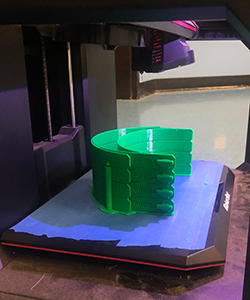Only 1 in 5 first-generation college students graduate with a bachelor’s degree within six years.
Only 1 in 5 Latinos ages 25-29 have a bachelor’s degree at all.
Gabriel Anguiano ’20 accomplished both.
After coming to the United States, Anguiano’s parents settled outside of Chicago in Hammond, Indiana. His father was deported a few times, and his mother started making trips back to Mexico to be with her mother when Anguiano was around six years old. They worked several jobs and, though there were times he didn’t see them much, their efforts allowed Anguiano to attend a private Catholic high school.
 “I owe it to them to work harder,” he said. “The risks they took, my dad being deported and coming back—all of those sacrifices were for my future. It gives me a different kind of motivation…a sort of chip on my shoulder.
“I owe it to them to work harder,” he said. “The risks they took, my dad being deported and coming back—all of those sacrifices were for my future. It gives me a different kind of motivation…a sort of chip on my shoulder.
“I never wanted to be a statistic.”
Anguiano was a member of the Wabash Liberal Arts Immersion Program, which supports students who come from first-generation, minority, and low-income backgrounds.
“Gabe had a rough start to his Wabash career from an academic perspective,” said WLAIP Director and Professor of Psychology Bobby Horton. “But he very quickly reached out to professors and dedicated himself to turning things around. By his junior year, he was completely transformed. He went from being uncertain and hesitant—though always polite and sincere—to being poised, forthright, and truly excelling.
“He graduated as one of our best and brightest.”
Anguiano graduated with a major in rhetoric and a minor in business. He was a captain on the soccer team for both his junior and senior years, a member of the Sons of Wabash, and a fellow with the Center for Innovation, Business, and Entrepreneurship (CIBE).
In November, it was announced that he was a recipient of an Orr Fellowship, which would place him at a company in Indianapolis to receive executive mentorship and develop entrepreneurial skills.
In order to be considered for an Orr Fellowship, a student must demonstrate leadership potential on and off campus, have a cumulative 3.5 GPA or higher, have extensive leadership experience, and have a strong interest in entrepreneurial business or organizational leadership.
Although many Orr Fellows’ plans were derailed due to COVID-19, including Anguiano’s, it is still an honor to be recognized by the organization.
“Receiving the fellowship solidified not only the sacrifices my parents made and the wisdom they guided me with over the phone while they were in Mexico, it solidified the sacrifices I had made—the discipline that I had.”
When Anguiano called his brother to tell him the news about the fellowship, the emotions became so overwhelming that his excitement turned into tears of relief.
“My brother even got emotional,” Anguiano said. “He told me, ‘I’m so proud of you. This shows that you’re different. You’ve always wanted bigger things.’”
Anguiano dreams of owning his own businesses—creating some startups and exits—but those aspirations are founded on the desire to give back.
“Gabe’s work is always done from his heart,” CIBE Director Roland Morin said. “In the CIBE, Gabe stepped up to help run engagement groups to provide real-world consulting services to local non-profits, including Crawfordsville’s Paramedicine program. And what he did is still making a difference in the everyday lives of people in the local community.”
Even though COVID-19 took away a logical first step for him in the Orr Fellowship, it also presented Anguiano with an opportunity to do what he loved for the community he loved. As he learned from his father, “There is always a way.”
In April, Anguiano and three other friends, including Jonathan Alcala ’18, decided to start 3D-printing face shields for hospitals around their town of Hammond, Indiana.
One of Anguiano’s friends has a sister who works in the COVID unit at Community Hospital in Munster, Indiana, and her hospital was lacking protective gear at the time. The four friends decided they had the time (even though one was working full-time and the other three were finishing their senior years in college), and they knew how to obtain the resources.
 With the experience they received as fellows with Wabash’s CIBE, Anguiano and Alcala began overseeing the crowdfunding, partnerships, operations, logistics, safety plans, and supply-chain management.
With the experience they received as fellows with Wabash’s CIBE, Anguiano and Alcala began overseeing the crowdfunding, partnerships, operations, logistics, safety plans, and supply-chain management.
They found designs on Department of Health and Human Services’ website. They obtained 50 sheets of plexiglass from a local supplier. The group partnered with five local high schools with 3D-printing labs. The group presented detailed safety plans to each school to explain how they would ensure proper social distancing and sanitation, and because the printing process can take a lot of time, much of the process was monitored remotely.
To date, the four friends, all of whom are first-generation Americans, had completed more than 1,200 3D-printed face shields for hospitals across the state.
“The risks of COVID-19 still exist and hospitals continue to have an increasing need for PPE,” Anguiano said. “We plan to continue our efforts until we know that our hospitals and frontline workers are well served.
“It’s been overwhelming and stressful, but this has also been one of the most fun things I’ve ever done. There is so much joy that comes from helping people.”
Not only are they helping local healthcare professionals, their operation became so large that they partnered with Hammond College Bound, a scholarship program that provides Hammond residents a $10,000 scholarship to any college in Indiana if they complete 40 service hours during the summer. They currently have 10 student volunteers helping with disinfecting, assembly, and packaging.
The goal for Anguiano is to help these students build their resume while also improving their city—something to talk about in college applications and internship interviews.
“People who come from backgrounds similar to mine sometimes don’t know what they want to do because they’re not exposed to opportunities,” Anguiano said. “Wabash did that for me, and now I have the chance to help students in my community even earlier than I thought I would.”
Three in five first-generation college students want to give back to their communities after graduation.
Gabriel Anguiano is one of them.
“This is what I’ve always wanted—to help people reach their goals, to give them hope.”